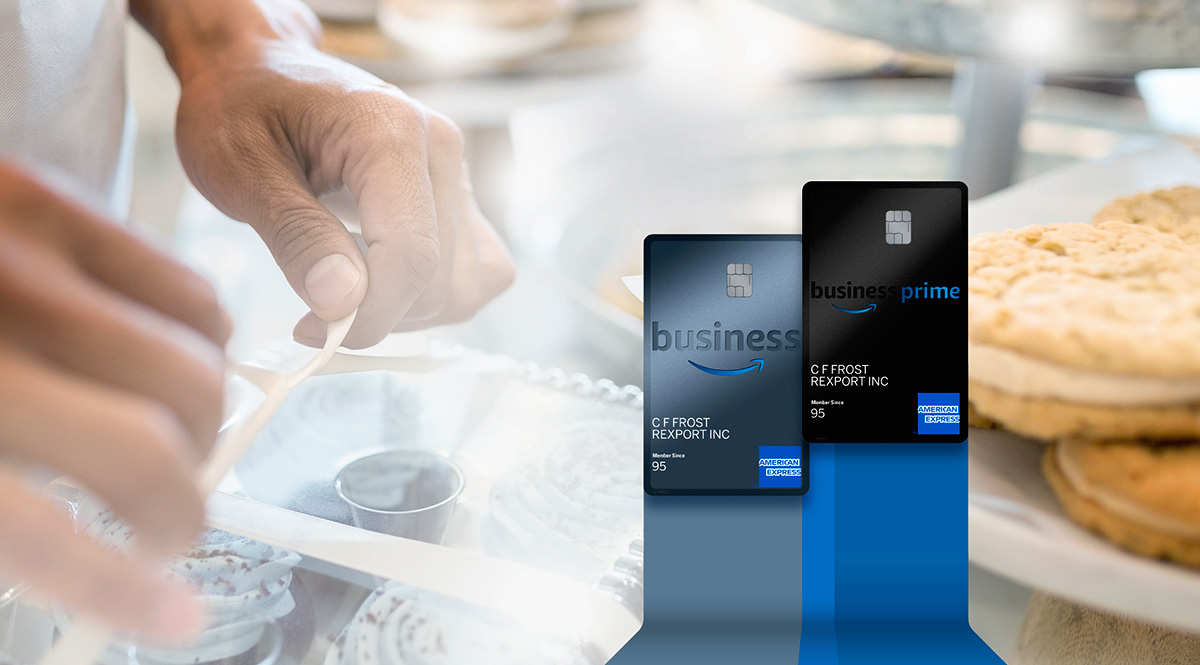

Finance
How To Get A Credit Card For Your Business
Modified: December 29, 2023
Looking to finance your business? Learn how to get a credit card for your business and manage your finances effectively.
(Many of the links in this article redirect to a specific reviewed product. Your purchase of these products through affiliate links helps to generate commission for LiveWell, at no extra cost. Learn more)
Table of Contents
- Introduction
- Understanding the Benefits of a Business Credit Card
- Assessing Your Business Needs
- Researching Different Business Credit Card Options
- Essential Criteria for Qualifying for a Business Credit Card
- Comparing Interest Rates and Fees
- Applying for a Business Credit Card
- Building and Maintaining a Strong Credit History for Your Business
- Responsible Credit Card Usage for Your Business
- Conclusion
Introduction
Welcome to the world of business credit cards! Managing finances is a crucial aspect of running a successful business, and having a dedicated credit card for your business can simplify the process while providing a host of benefits. In this article, we will explore the ins and outs of getting a credit card for your business and how it can be a valuable tool for financial management.
Having a separate credit card for your business not only helps you track business expenses efficiently but also gives you the opportunity to leverage various perks and rewards programs offered by credit card companies. Whether you are a small business owner or an established corporation, a business credit card can offer you convenience, flexibility, and financial control.
However, before diving into the world of business credit cards, it’s important to have a clear understanding of your specific business needs and financial goals. This will help you choose the most suitable credit card that aligns with your objectives and offers the right set of features and benefits for your business.
In the following sections, we will explore the various factors to consider when selecting a business credit card, including eligibility criteria, interest rates, fees, and how to apply. We will also discuss the importance of building and maintaining a strong credit history for your business, as well as responsible credit card usage.
So, let’s delve into the details and equip you with the knowledge you need to make informed decisions when it comes to obtaining a credit card for your business.
Understanding the Benefits of a Business Credit Card
A business credit card offers numerous advantages that can greatly benefit your company’s financial management. Understanding these benefits will help you make an informed decision when considering whether to get a credit card for your business:
- Separation of personal and business expenses: Having a business credit card allows you to keep personal and business expenses separate. This separation is crucial for accurate bookkeeping, making it easier to track and categorize expenses for tax purposes.
- Improved cash flow management: A business credit card provides a revolving line of credit that allows you to make purchases and pay for them over time. This can help improve your cash flow by providing flexibility in payment schedules and allowing you to better manage your business’s working capital.
- Access to financing: If your business needs quick access to funds, a credit card can provide a convenient solution. Many business credit cards offer the option of carrying a balance, allowing you to make necessary purchases or cover unexpected expenses when cash flow is tight.
- Rewards and perks: Business credit cards often come with rewards programs tailored specifically for businesses. These programs may include cashback on business expenses, travel rewards, discounts on office supplies, and more. By using your business credit card strategically, you can maximize the benefits and potentially save money on essential business expenses.
- Built-in expense tracking: Most business credit cards provide detailed monthly statements that outline your business expenses. This feature simplifies expense tracking, making it easier to reconcile your accounts, identify tax-deductible expenses, and generate financial reports.
- Establishing and improving your business credit: Using a business credit card responsibly can help establish and build your business credit history. This is valuable when you need to access larger lines of credit or secure funding in the future.
These benefits demonstrate the value of having a business credit card as a tool for managing your company’s finances effectively. However, it’s essential to thoroughly research and compare different credit card options to ensure you select the one that suits your business’s unique needs and goals.
Assessing Your Business Needs
Before applying for a business credit card, it’s important to assess your business’s specific needs in order to choose a card that aligns with your requirements. Here are some factors to consider:
- Business expenses: Evaluate your typical business expenses. Do you frequently make purchases for office supplies, travel expenses, or advertising? Understanding your spending patterns will help you determine which credit card features, such as rewards categories or cashback offerings, would benefit your business the most.
- Credit limit: Determine the credit limit you need for your business. Consider both your monthly expenses and any potential seasonal variations in spending. Ensure that the credit card you choose offers a sufficient credit limit to accommodate your business’s needs without putting unnecessary strain on your finances.
- Employee cards: If you have employees who make business-related purchases on behalf of your company, consider whether you would benefit from having supplementary cards for your team. This can simplify expense tracking and give you more control over business spending.
- Rewards and perks: Consider the types of rewards and perks that would be most beneficial to your business. Do you frequently travel for work? If so, a credit card that offers travel rewards and perks like airport lounge access and travel insurance might be ideal. Alternatively, if your business relies heavily on purchasing office supplies, a card with cashback rewards on such expenses could be more advantageous.
- Reporting and expense management: Evaluate the reporting and expense management tools offered by different credit card providers. Look for features like online account management, expense categorization, and the ability to export transaction data to accounting software. These tools can streamline your financial tracking and reporting processes.
By assessing your business’s specific needs, you can determine the key features and benefits you require in a credit card. This will help narrow down your options and ensure that the credit card you choose is tailored to your business’s unique requirements.
Next, we will explore the different business credit card options available and how to research and compare them effectively.
Researching Different Business Credit Card Options
When it comes to choosing a business credit card, it’s important to thoroughly research and compare the various options available. Here are some steps to help you make an informed decision:
- Identify your priorities: Start by clarifying what matters most to your business. Are you primarily focused on earning rewards, minimizing fees, or accessing a specific set of benefits? Understanding your priorities will guide your research and ensure that you select a credit card that aligns with your needs.
- Compare interest rates and fees: Take the time to review the interest rates and fees associated with each credit card option. Look for low annual percentage rates (APRs), reasonable late payment fees, and minimal annual fees. Keep in mind that some credit cards may offer an introductory 0% APR period, which can be beneficial if you plan to carry a balance.
- Examine rewards and benefits: Look beyond the headline rewards and benefits offered by credit card companies. Consider how those rewards align with your business’s spending patterns. For example, if you frequently travel for business, a card that offers travel rewards, airline miles, or hotel discounts might be advantageous. If your business relies heavily on purchasing office supplies, a card with cashback rewards on such expenses could be more valuable.
- Review customer reviews and ratings: Research customer reviews and ratings for the credit cards you are considering. This can provide insights into the customer service, reliability, and overall satisfaction of cardholders. Look for reviews from businesses similar to yours to gain a better understanding of how well a particular credit card option may meet your needs.
- Consider additional features: Explore any additional features or services offered by the credit card provider. Some cards may provide expense management tools, employee card controls, fraud protection, or integration with accounting software. Assessing these additional features can help you determine which credit card offers the most value for your business.
- Compare eligibility requirements: Ensure that you meet the eligibility requirements for each credit card option. Some credit cards may require a certain level of business revenue, credit history, or number of years in operation. Be realistic about your qualifications to avoid wasting time on credit cards that are unlikely to approve your application.
By thoroughly researching and comparing different business credit card options based on these factors, you can identify the best fit for your business. Remember to take your time during this process to make an informed decision that aligns with your financial goals and business needs.
Next, we will explore the essential criteria for qualifying for a business credit card to ensure you meet the requirements before applying.
Essential Criteria for Qualifying for a Business Credit Card
Before applying for a business credit card, it’s important to understand the essential criteria that credit card issuers typically consider. Meeting these requirements will increase your chances of approval. Here are the key qualifications to keep in mind:
- Legal business entity: To apply for a business credit card, you must have a legally recognized business entity. This can include sole proprietorships, partnerships, limited liability companies (LLCs), or corporations.
- Tax Identification Number (TIN) or Employer Identification Number (EIN): Most business credit card applications require a TIN or EIN. This unique identifier is used by the Internal Revenue Service (IRS) to track your business’s tax activities.
- Business credit history: Some credit card issuers may consider your business’s credit history when reviewing your application. If you have an established business credit profile, it can work in your favor. However, if you’re a new business or don’t have a business credit history, certain credit cards may evaluate your personal credit history instead.
- Owner’s personal credit history: Even if you’re applying for a business credit card, credit card issuers often consider the personal credit history of the business owner, particularly for small businesses or startups. Maintaining a good personal credit score will increase your chances of approval and may also impact the credit limit and interest rates offered.
- Business revenue: Credit card issuers may require you to provide information about your business’s annual revenue. Ensure that your business generates sufficient revenue to meet the issuer’s minimum income requirements, which can vary depending on the credit card provider.
- Years in operation: Some business credit cards may have a minimum requirement for the number of years your business has been in operation. For newer businesses, there are credit card options that cater specifically to startups and offer more lenient eligibility criteria.
Meeting these essential criteria is crucial when applying for a business credit card. It’s important to review the eligibility requirements for each credit card option you’re considering to ensure that your business meets the necessary qualifications.
Once you have determined that you meet the eligibility criteria, it’s time to move on to comparing interest rates and fees to find the most cost-effective option for your business.
Comparing Interest Rates and Fees
When evaluating different business credit card options, it’s essential to carefully compare the interest rates and fees associated with each card. Here’s what you need to consider:
- Annual Percentage Rate (APR): The APR represents the cost of borrowing on your credit card. It includes both the interest charged on balances carried over time and any annual fees. Look for credit cards with low APRs, especially if you anticipate carrying a balance from month to month.
- Introductory APR: Some credit cards offer an introductory period with a lower or even 0% APR for a specific duration, such as 6 or 12 months. This can be especially beneficial if you have large expenses coming up or need to make a balance transfer from another card. Be sure to understand when the introductory period ends and what the APR will be after the promotional period.
- Balance transfer fees: If you plan on transferring existing balances from other credit cards to your new business credit card, check if the card charges any fees for balance transfers. Some cards may offer promotional periods with no balance transfer fees, making it an attractive option if you have high-interest balances on other cards.
- Annual fees: Many business credit cards charge an annual fee, typically ranging from $0 to several hundred dollars. Consider the potential benefits and rewards you may receive in return for the fee. If the card offers significant rewards or perks that align with your business’s needs, the annual fee may be justified. Alternatively, you may prefer to choose a card with no annual fee if you don’t anticipate using the card frequently or don’t require the extra benefits.
- Foreign transaction fees: If your business involves international transactions or travel, be aware of any foreign transaction fees associated with the credit card. Some cards waive these fees, which can save you money when conducting business abroad.
- Late payment fees: It’s important to understand the late payment fees and penalties associated with a business credit card. Be sure to pay your credit card bill on time to avoid unnecessary charges and potential damage to your credit score.
By comparing the interest rates and fees of different business credit card options, you can identify the most cost-effective choice for your business. Consider your spending and payment habits, as well as your ability to pay off the balance in full each month, to determine the best balance between low fees and interest rates.
Next, we will discuss the application process for obtaining a business credit card and the necessary documentation you may need to provide.
Applying for a Business Credit Card
Once you have researched and compared different business credit card options, it’s time to apply for the card that best suits your needs. Here are the steps to follow when applying for a business credit card:
1. Gather necessary information: Before starting the application process, gather all the information you’ll need to provide, such as your business’s legal name, address, phone number, and tax identification number (TIN) or employer identification number (EIN). You may also need to provide details about your personal income and employment history.
2. Check your credit report: Review your personal and business credit reports to ensure their accuracy. It’s a good idea to address any errors or discrepancies before applying for a credit card. Lenders often consider credit history when evaluating your application.
3. Choose the right credit card: Based on your research and assessment of your business needs, select the business credit card that aligns most closely with your requirements. Consider the interest rates, fees, rewards program, and any additional benefits that will be valuable to your business.
4. Visit the credit card issuer’s website: Go to the website of the credit card issuer you have chosen. Look for the business credit card section and locate the application form. Some credit card issuers allow you to complete the application online, while others may require you to download a physical form.
5. Complete the application: Carefully fill out the application form, providing accurate and up-to-date information about your business and personal financial details. Be thorough and ensure that you’ve included all the necessary information as requested by the credit card issuer.
6. Submit supporting documentation: Depending on the credit card issuer and your business structure, you may need to provide supplementary documentation. This could include business registration documents, financial statements, bank statements, or any other documentation that supports your business’s financial stability.
7. Review terms and conditions: Read through the terms and conditions of the credit card before submitting your application. Understand the interest rates, fees, grace periods, and rewards program details. Being aware of these details will help you make informed decisions regarding credit card usage and help you avoid any surprises in the future.
8. Submit your application: Once you have completed the application and reviewed it for accuracy, submit it to the credit card issuer. Some issuers may provide an online submission option, while others may require you to mail or fax the application.
9. Wait for a response: After submitting your application, be patient and wait for a response from the credit card issuer. The duration of the approval process can vary, but most issuers will notify you within a few business days. In some cases, you may receive an instant approval decision.
10. Activate your card: If your application is approved, you will receive your business credit card in the mail. Follow the instructions provided to activate the card and start utilizing its benefits.
Remember to manage your business credit card responsibly, making payments on time and keeping your credit utilization ratio in check. Regularly review your statements and track your expenses to ensure that the card continues to serve your business’s financial needs effectively.
By following these steps, you can successfully apply for a business credit card and enjoy the convenience and financial flexibility it provides.
Building and Maintaining a Strong Credit History for Your Business
One of the key benefits of having a business credit card is the opportunity to build and maintain a strong credit history for your business. A solid credit history can open doors to favorable loan terms, higher credit limits, and better interest rates in the future. Here are some tips for building and maintaining a strong credit history for your business:
1. Use your business credit card responsibly: Make timely payments and aim to pay off your balance in full each month. This demonstrates your ability to manage credit responsibly and positively impacts your credit score.
2. Keep credit utilization low: Aim to use only a small percentage of your available credit to keep your credit utilization ratio low. High credit utilization can negatively impact your credit score, so be mindful of your spending and avoid maxing out your credit limit.
3. Monitor your credit reports: Regularly review your business credit reports to ensure the accuracy of the information. Address any errors or discrepancies promptly to maintain a clean credit history.
4. Establish trade lines with suppliers: Establish trade lines with suppliers who report payment history to credit bureaus. Consistently making payments to suppliers on time can contribute to building a positive credit history for your business.
5. Consider other forms of credit: In addition to a business credit card, consider other types of credit, such as a business line of credit or a small business loan, to diversify your credit profile. Responsible management of different credit accounts can boost your creditworthiness.
6. Keep personal and business finances separate: Maintain a clear separation between your personal and business finances. Avoid using personal credit cards or accounts for business expenses, as it may negatively impact your business credit history.
7. Pay attention to credit inquiries: Be cautious about excessive credit inquiries, as they can temporarily lower your credit score. Only apply for credit when necessary and avoid opening multiple credit accounts within a short period of time.
8. Stay on top of your business finances: Maintain organized financial records, track your expenses, and review your cash flow regularly. Being proactive in managing your finances will contribute to a healthy credit history.
9. Avoid late payments and defaults: Late payments and defaults can severely damage your credit history. Set up reminders or automatic payments to ensure you never miss a payment deadline.
10. Be patient: Building a strong credit history takes time, so be patient and consistent in your efforts. With responsible financial management, your business credit score will gradually improve.
By following these strategies, you can build and maintain a strong credit history for your business, which will enhance your access to future credit opportunities and contribute to the long-term financial health and success of your business.
Responsible Credit Card Usage for Your Business
Using a business credit card responsibly is crucial for maintaining a healthy financial position and ensuring the long-term success of your business. Here are some best practices for responsible credit card usage:
1. Create a budget: Set a clear budget for your business expenses and stick to it. This will help you track your spending and avoid unnecessary debt.
2. Only charge what you can afford: Before making a purchase with your business credit card, ensure that you have the means to pay off the balance. Avoid impulse purchases that could lead to financial strain.
3. Promptly pay your credit card bill: Make it a priority to pay your credit card bill on time each month. Late payments can lead to high interest charges, damage your credit score, and result in additional fees.
4. Pay off the balance in full: Whenever possible, aim to pay off the full balance on your credit card statement each month. This will help you avoid interest charges and maintain a low credit utilization ratio.
5. Monitor your credit card activity: Regularly review your credit card statements and transaction history to ensure accuracy and identify any unauthorized charges. Promptly report any discrepancies or fraudulent activity to your credit card issuer.
6. Avoid cash advances: Cash advances on your business credit card often come with high interest rates and fees. Instead, plan your business expenses carefully and use your card for purchases that can be paid off within the billing cycle.
7. Use your rewards strategically: If your business credit card offers rewards or cashback programs, utilize them strategically. Focus on earning rewards on your business’s regular expenses, such as office supplies or travel, to maximize the benefits.
8. Regularly review and update your credit card: As your business needs evolve, periodically reassess whether your current credit card aligns with your requirements. If necessary, explore other credit card options that offer more suitable rewards or terms.
9. Avoid exceeding your credit limit: Stay well below your credit limit to maintain a healthy credit utilization ratio. Maxing out your credit card can negatively impact your credit score and limit your financial flexibility.
10. Communicate with your employees: If you have employees who are authorized to use the business credit card, establish clear guidelines and expectations for its use. Regularly communicate with your team to ensure everyone understands responsible credit card usage.
By following these guidelines, you can establish responsible credit card habits for your business. This will not only help you avoid unnecessary debt and financial challenges but also strengthen your credit profile and create a solid foundation for future growth and financial success.
Conclusion
Obtaining a credit card for your business can be a valuable tool for managing finances and unlocking various benefits. By understanding the benefits, assessing your business needs, researching different credit card options, and comparing interest rates and fees, you can make an informed decision to select the most suitable credit card for your business.
Building and maintaining a strong credit history should be a top priority. Responsible credit card usage, prompt payments, and keeping credit utilization low will contribute to a positive credit profile and open doors to better financing options and favorable terms in the future.
Remember to continuously monitor your credit reports, stay on top of your business’s financial health, and make adjustments as needed. Regularly reassess your credit card choice to ensure it continues to meet your evolving business needs.
By utilizing your business credit card responsibly, you can optimize its benefits, earn rewards, and simplify financial management. With careful planning, budgeting, and strategic usage, your business credit card can become a valuable asset for your company’s growth and financial success.
Take the necessary steps to obtain a business credit card that aligns with your business’s goals, and embark on a journey of financial control, rewards, and enhanced creditworthiness. With a solid understanding of your business needs and responsible credit card usage, you can harness the power of a business credit card to propel your business forward.














